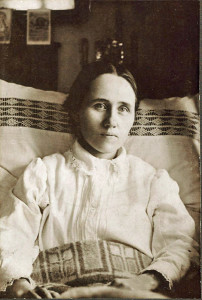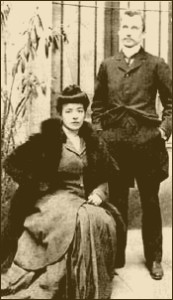On Sunday they’ll be saints, Popes John XXIII and John Paul II. The former was pope the first seven years of my life; he may have been pope when I made my first communion, but I’m not sure of that date. The latter was pope for much of the thirty-plus years I was away from the Church. Some are joyful about their canonizations; others are critical of what they did or didn’t do; others laugh at the very idea of saints and praying to dead people rather than to God.
Saints. Is it good or bad that John Paul II canonized so many seemingly ordinary people, sometimes with what appeared to be a political agenda? Is it good or bad that Francis has canonized several people lacking a second miracle?
I’ve researched the lives of more than 700 women saints and blesseds, in writing Sisterhood of Saints: Daily Guidance and Inspiration and for presentations, blog posts, videos, and personal edification since the book was published. Here are five things those women have taught me, and I believe can teach you, whether or not you’re Catholic, whether you believe in a deity or not:
- Talking with a saint is talking with a friend. Intellectually, I understand that I can go directly to any member of the Holy Trinity
 with my adoration, contrition, thanksgiving, and supplication, and often, I do. But just as I might seek counsel from different friends for different concerns, sometimes, it helps to talk with a person with heroic virtues who faced the same issue, magnified. If I’m having trouble forgiving someone for a perceived slight, who better to talk with than Maria Goretti, the 11-year-old who on her deathbed forgave her murderer, a man who would later have a conversion experience and attend her canonization?
with my adoration, contrition, thanksgiving, and supplication, and often, I do. But just as I might seek counsel from different friends for different concerns, sometimes, it helps to talk with a person with heroic virtues who faced the same issue, magnified. If I’m having trouble forgiving someone for a perceived slight, who better to talk with than Maria Goretti, the 11-year-old who on her deathbed forgave her murderer, a man who would later have a conversion experience and attend her canonization? - It’s all right not to be perfect. I’ve sinned big in my life, including most of the seven deadly ones. I know God can and will forgive
 anything if we come to him with a contrite heart and a desire to grow closer to him. I know he’s done that for me. But the example of women such as Angela of Foligno (one of Francis’s lacking-a-sec0nd-miracle canonizations)–who married young and didn’t let her husband or children get in the way of a life focused on material and sensual pleasure, and later was blessed with a mystical relationship with God–remind me not to despair or give up when I fail. If God could forgive the likes of Angela, he can forgive me.
anything if we come to him with a contrite heart and a desire to grow closer to him. I know he’s done that for me. But the example of women such as Angela of Foligno (one of Francis’s lacking-a-sec0nd-miracle canonizations)–who married young and didn’t let her husband or children get in the way of a life focused on material and sensual pleasure, and later was blessed with a mystical relationship with God–remind me not to despair or give up when I fail. If God could forgive the likes of Angela, he can forgive me. - Believing in a loving God doesn’t preclude being angry or frustrated with him from time to time. Just as we have bumps in the
 road in our relationships here on earth, we have bumps in our relationships with God. Many of the women on those prayer cards argued with or mouthed off to God from time to time, yet there is no denying the love on both sides. When I feel upset with God, I think of Teresa of Avila. During one contentious time, God told her this was the way he treated her friends. Her response: “Then no wonder you have so few!”
road in our relationships here on earth, we have bumps in our relationships with God. Many of the women on those prayer cards argued with or mouthed off to God from time to time, yet there is no denying the love on both sides. When I feel upset with God, I think of Teresa of Avila. During one contentious time, God told her this was the way he treated her friends. Her response: “Then no wonder you have so few!” - Heroic virtues come in different packages. There are plenty of examples of brave men and women who died torturous deaths for
 refusing to deny their faith or the very existence of God. They died for what they wrote or said. But faith can also help us all through the smaller challenges we face every day. I think of Anna Schaffer, the early 20th century laundress who had her life planned out and was earning money for her family and for her dowry to become a nun. She fell into a vat of lye, and became bedridden for the rest of her life. After a few years of anger at God, she came to realize she didn’t need to be a woman religious or mobile to do the work she was meant to do. She wrote, prayed for people, and provided counsel, all from her bed. Anna reminds me that it’s about bringing souls to the Kingdom, not about doing it in the manner easiest for me.
refusing to deny their faith or the very existence of God. They died for what they wrote or said. But faith can also help us all through the smaller challenges we face every day. I think of Anna Schaffer, the early 20th century laundress who had her life planned out and was earning money for her family and for her dowry to become a nun. She fell into a vat of lye, and became bedridden for the rest of her life. After a few years of anger at God, she came to realize she didn’t need to be a woman religious or mobile to do the work she was meant to do. She wrote, prayed for people, and provided counsel, all from her bed. Anna reminds me that it’s about bringing souls to the Kingdom, not about doing it in the manner easiest for me. - Being called to holiness doesn’t preclude joy, laughter and fun. They didn’t write great essays or experience stigmata or die horrificly.
 Maria and Luigi Quattrocchi, a 20th century Italian couple, were married for forty years and had four children. They were active in religious and lay activities. They also liked sports and their vacation home in the country. And in 2001, the Quattrocchis became the first couple to be beatified together. One of their sons said of his life growing up: “I remember a ‘noisy joy’ in the house, with no religious excesses—or boredom. … Ours was a normal family that sought to live its relationships on a plane of high spirituality.” The Quattrocchis remind me there’s no reason to make life or following the Lord harder than it is.
Maria and Luigi Quattrocchi, a 20th century Italian couple, were married for forty years and had four children. They were active in religious and lay activities. They also liked sports and their vacation home in the country. And in 2001, the Quattrocchis became the first couple to be beatified together. One of their sons said of his life growing up: “I remember a ‘noisy joy’ in the house, with no religious excesses—or boredom. … Ours was a normal family that sought to live its relationships on a plane of high spirituality.” The Quattrocchis remind me there’s no reason to make life or following the Lord harder than it is.
As for the two new saints, I’m excited about their new place in the Church I love, as imperfect as it is. And I’ll keep John XXIII and his jokes about his obesity in mind when I’m tempted to focus too much on my physical flaws, and John Paul II and his lifelong connection to youths of the world when I interact with young people. I’ll be reminded that we all are called to holiness.